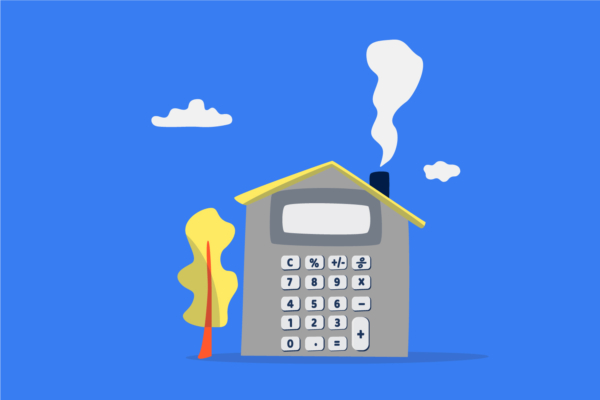
5 Considerations When Buying a Home with a Friend

When considering homeownership, you might think that the only way to buy a home is either with a spouse or on your own. But those aren’t necessarily the only options! You can also buy a house with a friend, which may be a great option if you don’t have a significant other and can’t afford to purchase a property on your own. However, when thinking about buying a home with a friend—either as a residence or an investment property—there are some serious considerations you should take into account. Buying a house is a major financial and legal commitment, and you’ll want to make sure everyone involved understands their ownership rights and financial responsibilities. Here we’ll review the major things you’ll want to discuss before you both sign on the bottom line.
From Mortgages to Home Equity Loans
Our local, award-winning lending team is ready to help you begin today.
1. Pick Your Friend(s) Carefully
If you’re thinking about buying a home with a friend, it’s likely you already have someone in mind. But just because you may share similar interests and have a great time together, that doesn’t necessarily mean they’re the best partner to buy a home with. In addition to getting along, you’ll want to make sure you agree on financial priorities. Ask yourself a few questions before moving forward:
- Is this person reliable?
- Are they completely trustworthy?
- Are they financially stable?
2. Discuss Your Finances
Even if you believe your friend (or friends) are more reliable than the sun rising, the final question of finances should be explored thoroughly. This may be more difficult than you would think—even married couples can feel uncomfortable when it comes to discussing finances—but it’s a step that absolutely should not be skipped.
As co-owners of a home, you’ll both be responsible for mortgage payments. If your friend isn’t able to pay the mortgage at any point, your own financial security could also be at risk.
Additionally, because your combined finances will determine the home loan amount you qualify for, as well as mortgage rates, there are a few specific financial topics that you should work through before applying for loans in order to get the best terms possible. These include:
- The down payment amount. This is, of course, the money you can pay upfront for the home. A higher down payment results in lower monthly payments, as well as a lower interest rate. The more you and your friend can pool together for the down payment, the lower your monthly mortgage payments will be.
- Your credit scores. Credit scores are calculated based on a mathematical formula that takes into consideration things like your bill-paying history, your current unpaid debt, and how much of your available credit you’re using. Most scores range from 300 to 850, with a higher score signaling to potential lenders you’re more likely to pay back the loan. As a result, lenders usually charge borrowers with higher credit scores a lower interest rate. This can save you and your friend a significant amount of money over the life of the mortgage.
- Your combined incomes. With higher incomes, you’ll be able to afford higher monthly payments, meaning lenders would be willing to approve a larger loan amount.
- Debt-to-income ratio (DTI). Your DTI is essentially your monthly debt payments divided by your gross monthly income. Put into numerical terms, if one person owes $1,000 a month in debt payments, and earns $4,000 before taxes, their DTI would be 25%. Lenders typically require a DTI of 45%, although the lower your DTI, the better the terms will be.
3. Decide on a Property Type
When buying a home with a friend, the living arrangements may be slightly different than if you were to purchase a house with a spouse or significant other. A single-family home could be a possibility, if you don’t mind living in close quarters with the other person. However, if you’d like your own space—or if you both think you might be able to take on tenants—a multifamily home like a triplex could be a good idea.
4. Agree on How to Title the Home
Another important consideration: how will you title the home. This decision determines what legal rights you and your co-owners will have to the property.
This is an incredibly important step in the homebuying process. Titling decides what happens to the home in the event that an owner dies or declares bankruptcy. The way a property is titled could mean the difference between you keeping your home and being suddenly forced to move out.
You and your friend should meet with a real estate attorney to be sure you pick the right option for you. A real estate attorney is critical because every state has their own laws—unless you’re an expert in your state’s specific real estate law, legal advice can be the difference between a stable mortgage and a nightmare.
The three basic ownership types in Texas include:
- Joint tenancy: This is usually the option chosen by married couples, as under this type of ownership, you and your friend will own the home equally. You both hold the title to the real estate and have equal rights. Joint tenancy also comes with a right of survivorship, meaning that if one of you passes away dies, the rights of ownership pass to the survivor.
- Tenancy in common: A tenancy in common title allows two or more people to hold a joint title to real estate, although the ownership percentages can be equal or unequal. This means that you might choose to own 40% of the financial interest in the house while your friend owns 60%. Each owner has the right to use and occupy the entire property and can’t prevent their co-owner from also using the property. One co-owner can sell their share without the other’s consent. And in contrast to joint tenancy, there is also no automatic right of survivorship—after the death of a co-owner, the other co-owner does not automatically assume the entire property and mortgage.
- Sole ownership: If you decide on sole ownership, it means that only one person is the legal owner. That person’s name will be on the deed and has full legal rights to the property, while the other person has none.
All of these types of ownership have their own pros and cons, and the above is just general information—it should not be interpreted as legal advice or the entirety of the laws governing co-ownership in Texas.
Buying a home is a legal and financial agreement that can affect your for the rest of your life. Choose your co-owner and legal counsel wisely!
5. Create a Cohabitation Property Agreement
This last step could save you many legal headaches down the road. While you might be fully confident in your choice of co-owner at the moment, life has a way of complicating situations.
For instance:
- What will you do if one of you wants to move out after a few years?
- How will you divvy up expenses should one of you suffer a job loss or a serious long-term illness?
- Who gets your “share” of the property if you die or are otherwise unable to fulfill your financial obligations?
- How are the profits going to be split if you sell the house?
- What happens if one co-owner sells their share?
- How is maintenance paid for?
- How are major renovations going to be paid for?
These are circumstances that need to discussed, with agreements put into a legal document. A legally binding cohabitation agreement can go a long way toward preventing future issues and disagreements.
Make an Informed Decision
As with any major purchase, it’s important to fully understand how it will impact your finances. Buying a home with a friend is no different. If anything, this is a decision you should put extra thought into, as it can have a lasting impact on your financial stability—not to mention the state of your friendship—for many years to come.
Ready to get prequalified?
Apply today and start your journey toward your new home.


